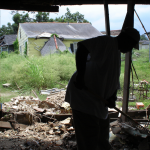Booker T. Washington High School Auditorium
1201 S. Roman StreetNew Orleans LA 70125
Financed with WPA funds and completed in 1942, the Booker T. Washington campus was the first new high school built specifically for Black students in New Orleans. The adjoining auditorium, built in Art Deco style and capable of seating 2,000 people, quickly became a de facto civic center for the city’s African Americans, hosting concerts by legendary Black artists as well as meetings for unions, civil rights groups, and professional organizations.
The facility also hosted recording sessions, New Orleans Symphony rehearsals, graduation ceremonies, recitals, film screenings, and other activities. “All of the black major events took place in that auditorium,” school librarian and 1962 alumna Emily Braneon recalled in 2001.
The auditorium’s first major performer was powerhouse opera singer Paul Robeson, whose appearance drew Black fans “en masse” in addition to “a fair sprinkling of whites,” according to Louisiana Weekly, which reported that the audience was “almost shaking the roof with thunderous applause” over the course of seven encores. Other giants of the Black entertainment world appeared later, including New Orleans natives Mahalia Jackson and Louis Armstrong, Marian Anderson, Bill “Bojangles” Robinson, and Dizzy Gillespie (Gillespie’s performance in 1949 proved to be influential on a young Ellis Marsalis, the eventual jazz patriarch).
The R&B stars of the day—such as Louis Jordan, Ray Charles, and Charles Brown—also performed at the auditorium. Among the promoters booking these shows was Dew Drop Inn proprietor Frank Painia.
A who’s who of New Orleans’ top musicians attended Booker T. Washington, including Alvin Batiste, Harold Battiste, Eddie Bo, Alton “Big Al” Carson, Edgar “Dooky” Chase Jr., James “Sugar Boy” Crawford, Edward Frank, Barbara George, Ernie K-Doe, Earl King, Melvin Lastie, Percy “Master P” Miller, Edgar “Big Boy” Myles, Robert Parker, James Rivers, Allen Toussaint, Earl Turbinton, and Ernest “Doc” Watson, to name a few. In the early 50s, revered band director Yvonne Busch taught many future stars here, including the members of Crawford’s Cha-Paka-Shawees.
The school closed after Hurricane Katrina in 2005, and all its original buildings except the auditorium—in a nod to its historical significance—were demolished. The discovery that the campus had been built on the site of a closed toxic dump complicated rebuilding plans, but a new school opened on this site in 2019.
For more about music education in New Orleans, click here.
Images




























